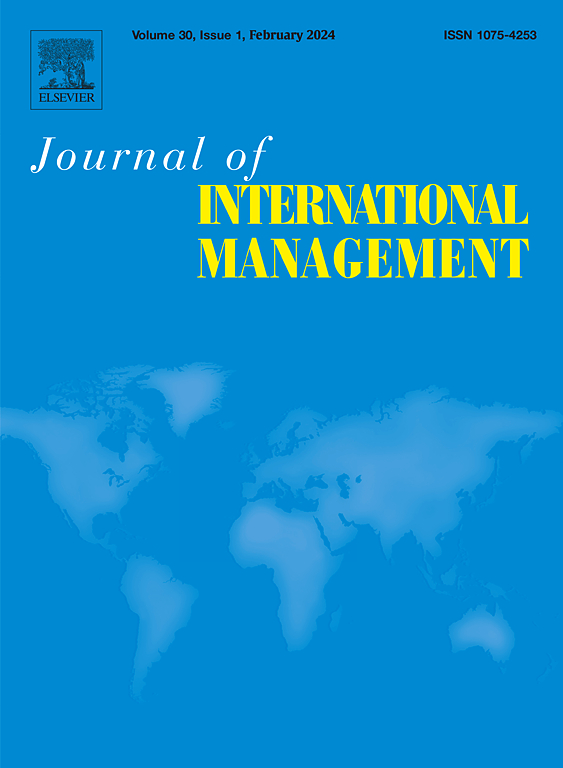新兴经济体B2B公司的安全支持和资源协调
IF 4.9
2区 管理学
Q1 MANAGEMENT
引用次数: 0
摘要
全球经济格局发生了重大变化,促使企业重新评估其国际化战略。在动荡的国际市场中,安全支持至关重要,它涉及战略调整,以降低风险,同时保持竞争力。本研究以资源编排理论(Resource Orchestration Theory, ROT)为基础,采用多案例研究设计,研究对象为四个来自亚洲发展中国家的B2B组织。研究结果显示,市场需求、监管环境和战略目标显著影响公司采取安全支持实践的决策。此外,该研究确定并分析了资源编排中遇到的权衡,例如成本效益与质量、专门化与控制、短期收益与长期可持续性之间的权衡。该研究通过识别和分析这些公司开发的特定资源协调能力来丰富ROT,并揭示了它们在部署中遇到的权衡。这些实证证据有助于在理解国际商务中的资源配置、战略决策和风险管理方面取得理论进展,为实践者和学者提供有价值的见解。本文章由计算机程序翻译,如有差异,请以英文原文为准。
Safe-shoring and resource orchestration for B2B firms in emerging economies
The global economic landscape has witnessed significant disruptions, prompting businesses to reevaluate their internationalization strategies. Safe-shoring, involving strategic realignment to mitigate risks while maintaining competitiveness, is crucial in volatile international markets. Drawing upon the Resource Orchestration Theory (ROT), the research employs a multiple-case research design involving four B2B organizations from an Asian developing country. Findings reveal that market demand, regulatory environments, and strategic objectives significantly influence firms' decisions to adopt safe-shoring practices. Moreover, the study identifies and analyzes trade-offs encountered in resource orchestration, such as those between cost-effectiveness and quality, specialization and control, and short-term gains versus long-term sustainability. The study enriches ROT by identifying and analyzing specific resource-orchestrated capabilities developed by these firms and uncovers trade-offs encountered in their deployment. The empirical evidence contributes to theoretical advancements in understanding resource allocation, strategic decision-making, and risk management in international business, providing valuable insights for practitioners and scholars alike.
求助全文
通过发布文献求助,成功后即可免费获取论文全文。
去求助
来源期刊

Journal of International Management
MANAGEMENT-
自引率
9.80%
发文量
67
审稿时长
81 days
期刊介绍:
The Journal of International Management is devoted to advancing an understanding of issues in the management of global enterprises, global management theory, and practice; and providing theoretical and managerial implications useful for the further development of research. It is designed to serve an audience of academic researchers and educators, as well as business professionals, by publishing both theoretical and empirical research relating to international management and strategy issues. JIM publishes theoretical and empirical research addressing international business strategy, comparative and cross-cultural management, risk management, organizational behavior, and human resource management, among others.
 求助内容:
求助内容: 应助结果提醒方式:
应助结果提醒方式:


